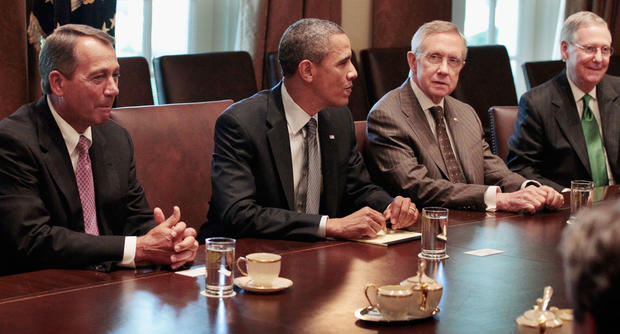As debt "D-Day" approaches, McConnell-Reid alternative plan gains favor
With just two weeks to go until debt "D-Day" and no grand agreement on raising the U.S. borrowing limit in hand, it appears increasingly likely lawmakers on Capitol Hill will pick a modified version of Sen. Mitch McConnell's back-up plan to avoid immediate economic calamity.
Mr. Obama last met formally with lawmakers from both parties at the White House on Thursday (but word emerged today that he met privately with House Speaker John Boehner and House Majority Leader Eric Cantor last night). Negotiations have shifted to Capitol Hill, where politicians are working on what is now being called the McConnell-Reid plan since Senate Majority Leader Harry Reid decided that a variation of the Kentucky Republican's proposal may be the only way to avoid the first ever U.S. default on its debt obligations. The original proposal did nothing to address long-term structural issues facing the U.S. spending habits.
The Senate Republican Leader last week floated a plan a to allow President Obama to raise the legal limit on U.S. borrowing in exchange for a trio of politically unpopular votes on the government's spending limit between now and Election Day 2012.
McConnell has said his plan is not his first choice, but he said he refused to help Mr. Obama get re-elected and worried that Republicans would be blamed if the U.S. defaulted on its debt obligations.
Senate Majority Leader Harry Reid on Monday vowed to keep senators in Washington, including weekends, until the two sides come to an agreement.McConnell's legendary political instincts appear to be intact. A CBS News poll released Monday showed that 71 percent of respondents disapprove of the way Republicans have handled the debt talks.
Meanwhile, the House of Representatives this week plans to vote on its own more conservative proposal, though it is not expected to garner enough support to pass the Democratically-controlled Senate. The House plan, known as "cut, cap and balance," conditions an increase in the U.S. borrowing limit on an amendment to the U.S. Constitution that would require a balanced budget each year.
That would allow conservatives in the House to vote on their "cut, cap and balance" bill, giving the Tea Party faction of the party a symbolic victory, even if it has no chance of becoming law. Constitutional amendments require approval from two-thirds of both chambers and then ratification from 38 of 50 state legislatures.
Mr. Obama has vowed to veto the House Republican effort if it were to make it to his desk.
While McConnell's original plan allowed for an increase in the debt ceiling without any mandatory cuts in long-term spending, the modified McConnell-Reid version would reportedly cut the deficit by about $1.5 trillion over the next decade.
The Obama administration and many economists, including Federal Reserve Board Chairman Ben Bernanke, have warned of economic catastrophe if the $14.3 trillion debt ceiling is not raised before August 2.
Both Democrats and Republicans want to use the threat of that deadline to work out a broader package on long-term deficit reduction. Republicans are looking to cut trillions of dollars in federal spending, while Democrats are pushing for a more "balanced approach," which would include both spending cuts and higher revenue to the government.
Mr. Obama and House Speaker John Boehner have both publicly said they hope to get a "grand bargain" on the deficit reduction, on the order of $4 trillion in savings over the next decade. But finding a compromise on how to get there is harder than simply stating it as a goal.
Republican Sen. Tom Coburn, a conservative from Oklahoma and a consistent deficit hawk, unveiled his own plan to cut $9 trillion in long-term spending.
"I think the McConnell plan is more of Washington not taking responsibility," Coburn said Sunday on CBS' "Face the Nation," "It is a great political plan: it takes the pressure off all of the politicians, but allows us to pass a debt limit without making the hard choices that this country has to make."
